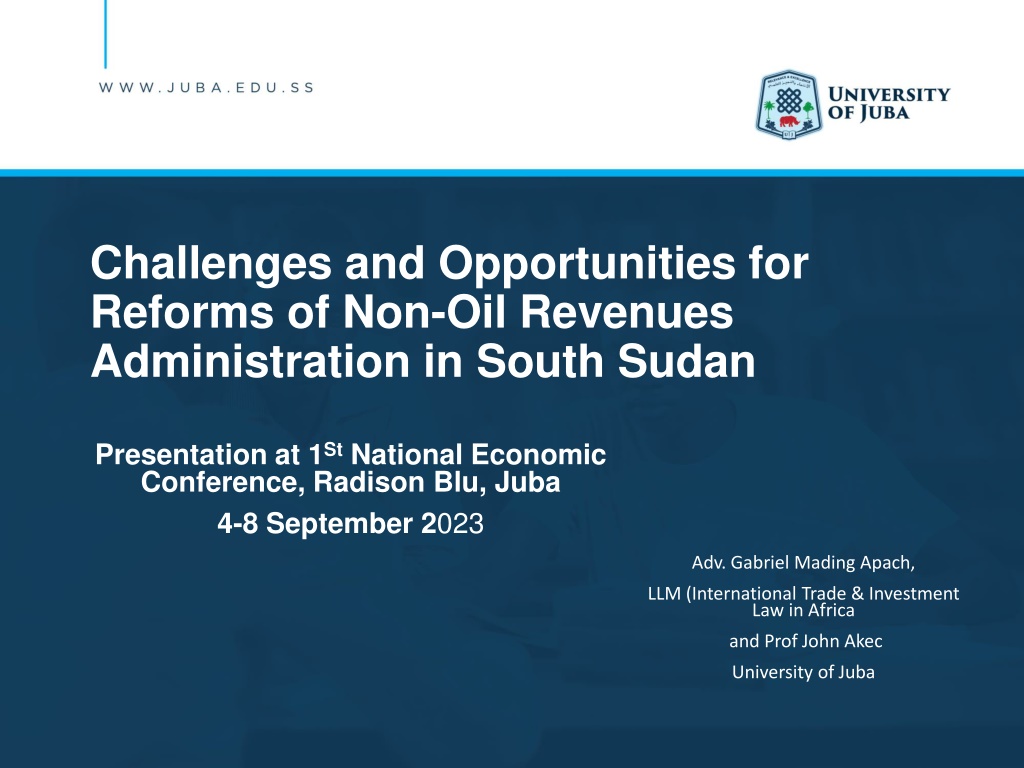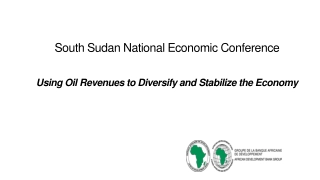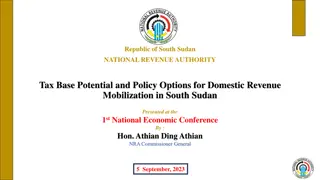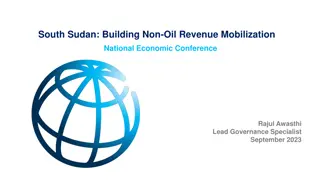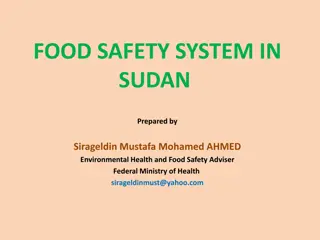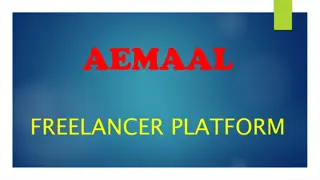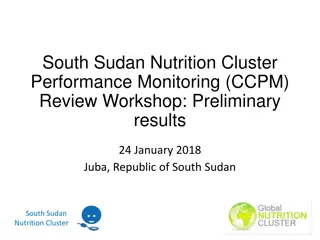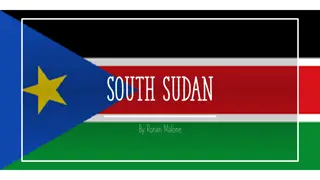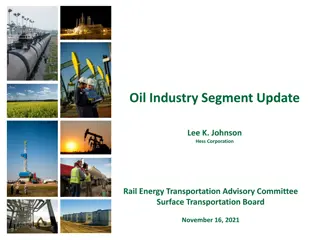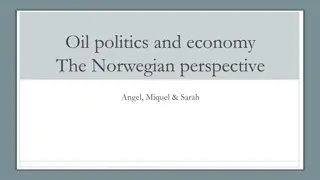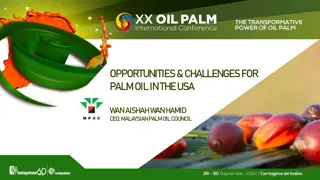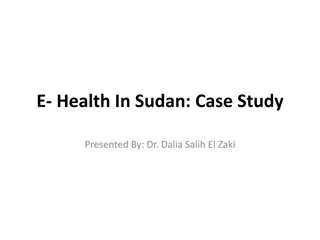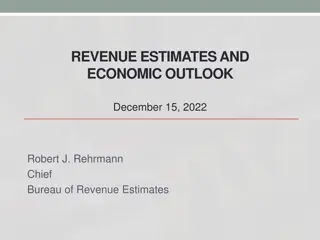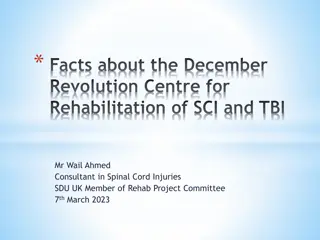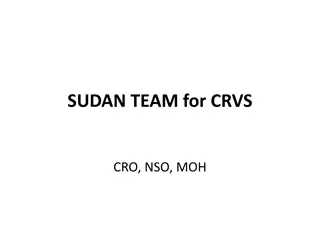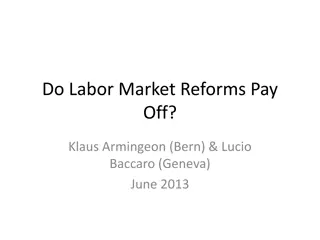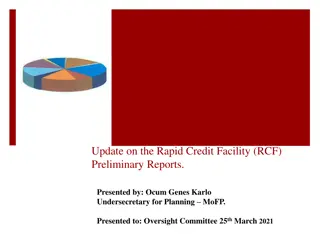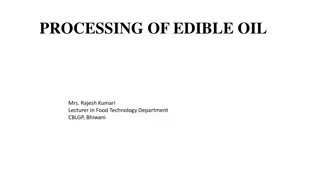Challenges and Opportunities for Reforms of Non-Oil Revenues Administration in South Sudan
The presentation highlights the reliance on oil revenues in South Sudan and the need for reforms in non-oil revenue administration. It discusses sources of non-oil revenue, factors hindering revenue mobilization, and opportunities for reforms to diversify the economy. The objectives of non-oil revenue mobilization, including raising revenue for government expenditure, economic stability, growth in investment, and balance of payments, are emphasized.
Download Presentation

Please find below an Image/Link to download the presentation.
The content on the website is provided AS IS for your information and personal use only. It may not be sold, licensed, or shared on other websites without obtaining consent from the author. Download presentation by click this link. If you encounter any issues during the download, it is possible that the publisher has removed the file from their server.
E N D
Presentation Transcript
Challenges and Opportunities for Reforms of Non-Oil Revenues Administration in South Sudan Presentation at 1St National Economic Conference, Radison Blu, Juba 4-8 September 2023 Adv. Gabriel Mading Apach, LLM (International Trade & Investment Law in Africa and Prof John Akec University of Juba
Outline of Presentation 1. Introduction 2. Objectives of Non- Oil Revenue Mobilisation 3. Sources of non-oil revenue 4. Factors Hindering Revenue Mobilization in South Sudan 5. Opportunities for Reforms 6. Conclusions and Recommendations
Introduction Since South Sudan declared independence from Sudan in July 2011, oil- revenues have been the major source of revenue between 96% and 98% of government s budget and 99.8% of country s export earning (KPMG, 2017). Contribution of tax revenues to the budget has been extremely minimal. A report by World Bank on Doing Business in South Sudan 2018 ranked the country as number 66th out 190 countries in the world and lowest in Sub Sahara Africa in terms of percentage of corporate profits paid (KPMG, 2017. South Sudan amongst world s most oil-dependent countries. As a result, the economy has not diversified, leaving the country to rely too much on oil-revenues. This has exposed the country s economy to shocks due to volatility of oil prices in the global market from 2014 to 2017, resulting in a fiscal deficit of 23% of GDP and contraction of economy by 13.8% in 2016 (See IMF, 2017, p. 36, KPMG, 2017).
Objectives of Non-Oil Revenue Mobilisation 1 Raising revenue: The main reason for revenue collection is to raise funds for government s expenditure. In capitalist countries, private entities contribute greatly in financing government expenditure by paying taxes on profits, license fees, employee s incomes, and tariffs on good imports. Walk, D Taxation and Taxable capacity in under-developed countries in Economic Development in Africa (Oxford, 1965) p.129. Economic stability and development: The revenue is indispensable even for all countries, including those countries which have attained a significant level of economic development and prosperity. During austerity measures when oil production was shut down in 2012, the non-oil revenue served as the most important source of funding of government expenditure besides reserves and borrowing Growth on Level of investment: Revenue collection contribute to growth of investment. This is so because a country maybe endowed with natural resources yet lacks funds to exploit them effectively Balance of payment: South Sudan is one of less developed countries that faces problem of balance of payment. Tax policy may be used to enhance national production and increase exports.
Objectives of Non-Oil Revenue Mobilisation Resources allocation: Revenue collection is used as to achieve and render some commodities more expensive by imposing heavy taxes. This method is used to protect infant industries. Income redistribution: In the words of Birds and Oldman, revenue helps to check income inequalities.
Sources of Non-Oil Revenue1 1. Domestic Taxes which include a. Personal income tax (PIT) These include Gross income, which means income earned or accrued from all sources which are not exempt under this Act including (a) wages; (b) entrepreneurial activities; (c) rents; (d) the use of intangible property; (e) interest; 9 Act 1 Personal Income Tax Act 2007 (f) dividends; (g) capital gains; (h) lottery and other gambling winnings; and (i) any other source that increases the taxpayer s net worth.
Sources of Non-Oil Revenue1 a. Business profit tax (BPT) Under section 65 of Taxation Act, 2009, a business profit tax shall be charged on the taxable profit of taxpayers.
Sources of Non-Oil Revenue2 (1) Taxable profit for the purposes of taxation shall mean the difference between gross income earned or received during the tax period and any deductions allowable under this law. (2) Taxable profit for a resident taxpayer shall be the taxable profit from South Sudan and foreign source incomes. (3) Taxable profit for a non resident taxpayer shall be only the taxable business profit from South Sudan source income. c. Property Tax (PT) The object of the income tax for a resident individual taxpayer shall be all taxable income from South Sudan s income sources and foreign source income. (2) The object of the tax for a non-resident individual taxpayer shall be taxable income from South Sudan sources of income.
Sources of Non-Oil Revenue3 d. Excise Tax (ET) The excise tax includes: Air transport service means airplanes or other modes of airborne equipment which carries passengers or cargo for a fee. Alcoholproduct means any article covered by Harmonized System; Excisablegoods means any goods or services subject to this Chapter, and includes: air transport services;alcohol products; insurance services; fuel; telecommunication services; and tobacco products. Excisetax means an indirect tax that is included in the selling price of excisable goods;
Sources of Non-Oil Revenue4 2. Tariffs: Charges on imported and exported commodities. It is a border measure as opposed to domestic taxes. Rules of Origin Wholly Obtained in the FTA territory Examples Copper mined in Zambia Coconuts and bananas grown in Cape Verde Chickens born and raised in Tanzania
Sources of Non-Oil Revenue5 Wholly produced goods made from original materials Examples: Coconut milk made from coconuts grown in Mauritius Jam made from Ghana Papaya and Kenyan sugar Hamburger meat patties made from Namibian Beef
Factors Hindering Non-Oil Revenue Mobilisation 1 a. Tax evasion committed by taxpayers Taxpayers together with tax officers abuse the complexity of tax laws (e.g., section 23 of taxation Act, that talks about self-assessment this has ben abused, examples: - under-reporting turnover over-reporting expenditure, reducing the pay roles, changing the rental/lease agreement and hiding sub-contractors agreement manipulation of currency. Hiding sub-contractors agreement
Factors Hindering Non-Oil Revenue Mobilisation 2 b. Collusion between tax officers and taxpayers Tax officials can abuse their position to: - issue tax exemptions, tax clearance certificate on emergency basis which are not justified apply lower tax rates, un-register corporates from the tax registers in exchange for lower private gain. clearing the system on penalties
Factors Hindering Non-Oil Revenue Mobilisation 3 backdating late payments and late filing to reduce tax liabilities demoting large companies to small and medium columns amendment of names and issue a new tax identification number. Facilitating the smuggling of goods across a national border to avoid tax and duty payments. Facilitating the avoidance or understatement of a tax or duty liability through the acceptance of an under-valuation or misclassification of goods in the processing of a customs entry.
Factors Hindering Non-Oil Revenue Mobilisation 4 c. Corruption by the tax officers themselves, without any direct taxpayer interaction. Tax officials can extort bribes from taxpayers by threatening them to pay above rates, otherwise they would face serious auditing. They can also simply steal the tax revenues collected, by asking the taxpayers to give them cash and they take it to the bank, in that process they pay less taxes and take much of it. Sometimes, they use external auditing whereby, the officers collude with external auditors to receive more money than government.
Factors Hindering Non-Oil Revenue Mobilisation 5 d. Exemptions The provision of certificates of exemption for taxpayers who would not otherwise qualify. e. The closure of a tax audit without any adjustment being made or penalties being imposed for an evaded liability. f. Low wage levels The poor salaries at the tax administration compared to the private sector invited corruption g. Monopoly Power and the Discretionary Power of Tax Officials
Factors Hindering Non-Oil Revenue Mobilisation 6 h. Complexity of Tax Laws in relation to knowledge of tax officers i. Lack of Monitoring and Supervision j. Lack of Political Will and Commitment to Effect Tax Reforms K. SOFA (Status of Forces Agreement) between South Sudan and UNMISS which exempts all contractors from paying taxes on goods and services supplied to UNMISS
Factors Hindering Non-Oil Revenue Mobilisation 6 L. Intangible Property taxes It is provided under section 75 of the taxation act, 2009 as amended that intellectual property is taxable, but there is no form of registration of IP that exists in South Sudan. m. Lack of taxes arbitration/ dispute resolution mechanism as provided under section 49 of the taxation act, 2009. This has given a room for negotiation by tax payers and tax officers leading to compromise
Conclusion Despite some improvement in non-oil revenue collection in South Sudan, the country has not maximally attained the international minimum standard for collecting non-oil revenue and therefore, there is a need for the government to adopt measures that will improve the effectiveness of non-oil revenue mobilisation.
Recommendations1 Rationalize the design of tax law The tax system in the country should be consolidated, with different taxes levied by all tiers of government. Especially all levels of government to give the NRA a sole responsibility of collecting taxes. Rewards for Information as provided in section 121 Section 121 provides that, if an informant submits evidence that successfully establishes that a taxpayer has evaded, or is attempting to evade any or all of his or her tax liabilities, the informant shall be granted a reward equal to thirty (30%) percent of the amount of tax collected on the basis of such information.
Recommendations2 Accountability by way of recruiting qualified tax officers Some tax officers do not have expertise in taxation. Other graduated from unrelated fields but end up working in sensitive unit in taxation. Restructure tax administration agencies The auditing firms must have the international minimum standard to qualify for auditing and under the supervision by the government.
Recommendations3 Establish a code of ethics At the national level, the country should develop a comprehensive code of ethics that spells out appropriate and inappropriate behaviours for politicians, taxpayers and tax officers. This is to avoid interference with taxes. To enact laws on intellectual property rights to encourage investors to establish in South Sudan. The fear of infringement of intellectual knowledge is a key issue to foreign investors. Reduce monopoly power Tax officers should be assigned on rotational basis to avoid the collusion with taxpayers. The tax unit that does taxes assessment should be separate from the audit unit.
